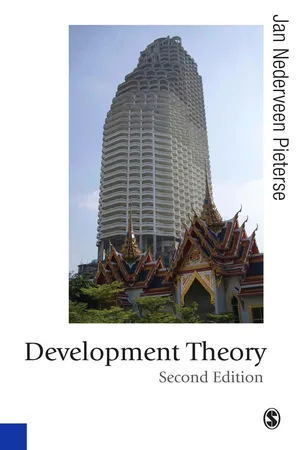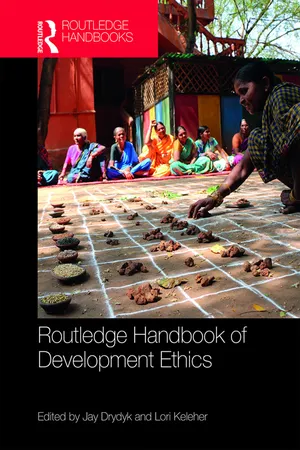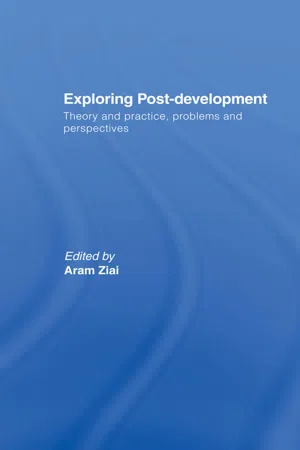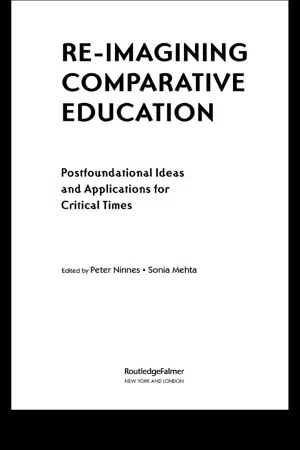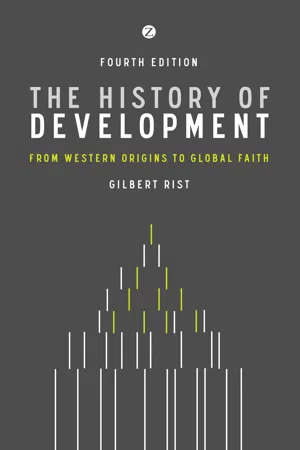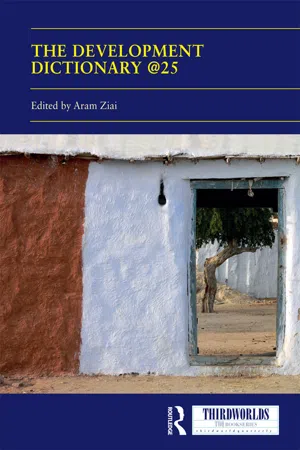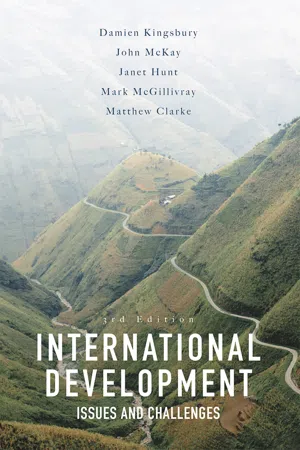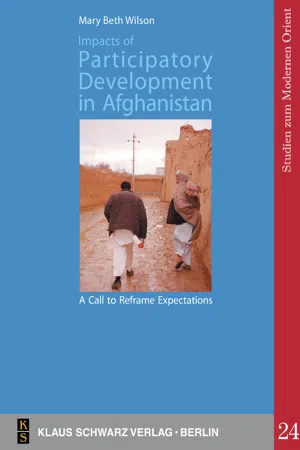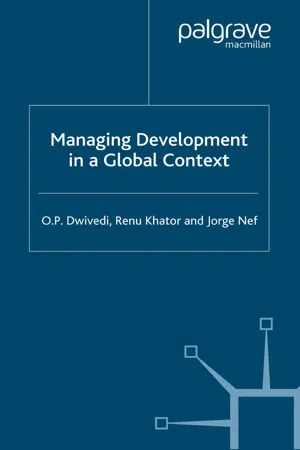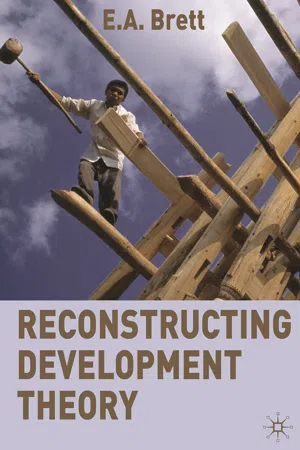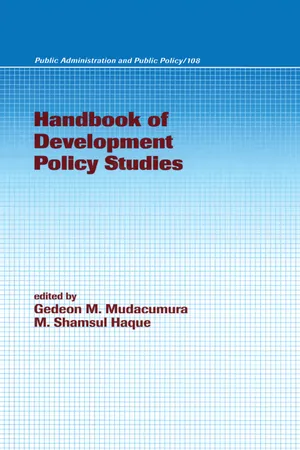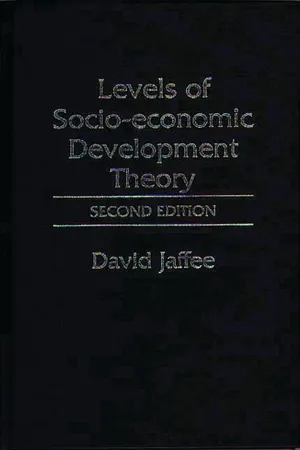Social Sciences
Post Development Theory
Post-development theory critiques the traditional development paradigm, arguing that it perpetuates inequality, environmental degradation, and cultural imperialism. It challenges the idea of progress and modernization, advocating for diverse, localized approaches to development. This perspective emphasizes the importance of understanding local contexts and empowering communities to shape their own development paths.
Written by Perlego with AI-assistance
Related key terms
1 of 5
12 Key excerpts on "Post Development Theory"
- eBook - ePub
- Jan Nederveen Pieterse(Author)
- 2009(Publication Date)
- SAGE Publications Ltd(Publisher)
If you live in Mexico City today, you are either rich or numb if you fail to notice that development stinks … The time has come to recognize development itself as the malignant myth whose pursuit threatens these among whom I live in Mexico … [T]he ‘three development decades’ were a huge, irresponsible experiment that, in the experience of a world-majority, failed miserably. (1985: 78)Post-development overlaps with western critiques of modernity and techno-scientific progress, such as critical theory, poststructuralism and ecological movements. It parallels alternative development and cultural critiques of development. It stands to development as ‘deep ecology’ does to environmental management. There are different strands to this way of looking at development. Anti-development is rejectionism inspired by anger with development business-as-usual. Beyond development (‘au delà de développement’) combines this aversion with looking over the fence. In post-development , these are combined with a Foucauldian methodology and theoretical framework of discourse analysis and a politics inspired by poststructuralism. These positions are not all consistent and besides, as a recent approach, post-development thinking is not theoretically developed. The overlap among these sensibilities is sufficient to group them together here under the heading of post-development.Development is the management of a promise – and what if the promise does not deliver? Living in Chiapas or other oppressed and poor areas, chances are that development is a bad joke. The question is what is to be done with this assessment. Post-development is not alone in looking at the shadow of development; all critical approaches to development deal with its dark side. Dependency theory raises the question of global inequality. Alternative development focuses on the lack of popular participation. Human development addresses the need to invest in people. Post-development focuses on the underlying premises and motives of development, and what sets it apart from other critical approaches is its rejection of development. The question is whether this is a tenable and fruitful position.In the 1980s these views crystallized around the journal Development: Seeds for Change . They have been taken up by intellectuals in Latin America (Esteva, Escobar), India (see Dallmayr 1996 on the ‘Delhi school’), Pakistan (Rahnema and Bawtree 1997), Malaysia (Just World Trust 1995), France (Latouche 1993), Switzerland (Rist 1997), Germany (Sachs 1992a), Belgium (Verhelst 1990), England (Seabrook 1994), Ireland (Tucker 1999), and Japan (Lummis 1991). They have become prominent since they coalesce with ecological critiques and ecofeminism (Mies 1986, Shiva 1988b) and through bestsellers such as Sachs’s Development Dictionary - Available until 3 Feb |Learn more
- Jay Drydyk, Lori Keleher, Jay Drydyk, Lori Keleher(Authors)
- 2018(Publication Date)
- Routledge(Publisher)
Of the countless objections to post-development, two salient clusters are Mitu Sengupta 38 reviewed below, one to do with post-development’s characterization of development discourse, and the other, with its articulation of alternatives. In relation to post-development’s characterization of ‘development,’ the argument is that, although the post-development school denounces development theory for rendering an over- generalized and essentialized view of the world, it bases its critique on precisely such an over- generalized and essentialized view of development theory; one that is blind to the myriad ways in which theorizing about development has changed over the years, and to the rising diversity among development institutions. Development theory has progressed well beyond the heavy emphasis on economic growth and industrialization of its early years, Pieterse (1998) points out, writing in the late 1990s. Concepts such as basic needs, participation, sustainability, and endog- enous development are “no longer controversial” and have “long been adopted in mainstream development” (ibid., 348–349). Post-development is also faulted for failing to recognize that not all practical applications of ‘development’ are the same, and that development programs can be creatively resisted, transformed, and reformulated by local cultures, leading to hybrid outcomes that defy clear categorization (see Nustad 2001). Post-development is criticized, moreover, for holding ‘development’ responsible for pov- erty and other social ills that, in many cases, existed prior to it (and thus could not have been caused by it), and for “demonising industrial modernity” (Ziai 2004, 1048). It is pointed out that many social movements and local organizations in the global South have made clear demands for “access to development” (Pieterse 1998, 363), human rights, and other so-called ‘Western’ inventions, and that development has produced man unambiguous positives, such as rising life expectancies. - eBook - ePub
Exploring Post-Development
Theory and Practice, Problems and Perspectives
- Aram Ziai(Author)
- 2007(Publication Date)
- Routledge(Publisher)
Rahnema with Bawtree, 1997 ). According to the editors of this work, the word ‘post-development’ was first used at an international colloquium in Geneva in 1991. Six years later, it had caught up in the imagination of critical scholars and practitioners in the development field. Reactions on all sides of the scholarly-political spectrum have continued since, resulting in a vibrant, albeit at times somewhat scattered, debate. This debate has brought together practitioners and academics from many social science disciplines and fields.To fully understand the emergence of the notion of post-development and how it has functioned in the international development debate, it is important to locate it briefly within the development studies field. Over the past 50 years, the conceptualization of development in the social sciences has seen three main moments, corresponding to three contrasting theoretical orientations: modernization theory in the 1950s and 1960s, with its allied theories of growth and development; dependency theory and related perspectives in the 1960s and 1970s; and critical approaches to development as a cultural discourse in the second half of the 1980s and the 1990s.Modernization theory inaugurated a period of certainty in the minds of many theorists and world elites, premised on the beneficial effects of capital, science and technology; this certainty suffered a first blow with dependency theory, which argued that the roots of underdevelopment were to be found in the connection between external dependence and internal exploitation, not in any alleged lack of capital, technology or modern values. For dependency theorists, the problem was not so much with development as with capitalism. In the 1980s, a growing number of cultural critics in many parts of the world questioned the very idea of development. They analysed development as a discourse of Western origin that operated as a powerful mechanism for the cultural, social and economic production of the Third World (e.g. Apffel-Marglin and Marglin 1990 ; Ferguson 1991; Escobar 1995 ; Rist 1997 - eBook - ePub
Re-Imagining Comparative Education
Postfoundational Ideas and Applications for Critical Times
- Peter Ninnes, Sonia Mehta(Authors)
- 2004(Publication Date)
- Routledge(Publisher)
Second, the issue of developmental process received attention. Post-structuralists disrupted the notion that development was somehow natural or inevitable if certain conditions were met, or indeed that development was universally desired. For poststructuralists, ‘development’ itself was an invention, a component of a language of power, and a social construction with a discursive or cultural history (Peet and Hartwick, 1999, p. 143; Escobar, 1995). In addition, Escobar argued, “development was — and continues to be for the most part — a top-down, ethnocentric, and technocratic approach, which treated people and cultures as abstract concepts, statistical figures to be moved up and down in the charts of progress” (Escobar, 1995, p. 44).While post-development theorists may contend that their approaches are relatively radical, critics such as Nederveen Pieterse (2000) argue that post-development views are not new. For instance, Pieterse (2000) suggests that dependency theories also value autonomous processes and argue against economic, social and cultural dependency. He notes that whereas dependency theorizing privileges the nation-state, post-development thinking privileges the endogenous and places great value on local and grassroots actors and factors (Nederveen Pieterse, 2000, p. 181). Although Pieterse (2000) identifies many similarities between post-development and alternative development, Escobar (1995) advocates for “alternatives to development” rather than “alternative development,” because, as noted by Nandy (1989, p. 270), “most of the [alternative development] efforts are also products of the same worldview which produced the mainstream concept of science, liberation, and development.” According to Escobar (1995), alternatives to development can be found through the engagement with social and grassroots movements and recognition of their role as legitimate and authentic instruments to bolster the alternatives to development. Critics of this position, such as Pieterse (2000), warn that even when there is considerable effort to depart from mainstream development in favor of NGOs and other similar organizations, the NGOs themselves may depend on international aid agencies and multilateral organizations. As a result, Nederveen Pieterse (2000, p. 182) argues, there is a likelihood of propagating a new wave of “alternative managerialism,” in which “lack of humanity” becomes the norm. - eBook - PDF
The History of Development
From Western Origins to Global Faith
- Gilbert Rist, Patrick Camiller(Authors)
- 2014(Publication Date)
- Zed Books(Publisher)
‘POST-DEVELOPMENT’ In previous editions of this work, I wrote that ‘development’ was like a star whose light can still be perceived even though it has been dead for a long time, and for ever. This echoed in turn Wolfgang 23 cocuo Sachs’s statement: ‘The idea of development stands like a ruin in the intellectual landscape and the time is ripe to write its obituary.’ 1 Let us admit that we were both mistaken: ‘development’ continues to survive, even if, within the international institutions, its original aims have been whittled down to the struggle against poverty or achievement of the Millennium Goals. Paradoxically, it is under the impact of critiques addressed to it that ‘development’ has once again become an object of debate. Belief, too, finds it difficult to give up the ghost. At a theoretical level, the Western origins of ‘development’ have been tacitly accepted – hence the greater attention paid to those active in it, to their capacities, potentialities and interests. As if it were a great discovery, it is recognized that ‘development’ has to be built ‘from the bottom up’, and that its medium-range objectives may vary from one society to the next. In a way the policies have become less rigid, but the explanatory principle (economic growth) has not changed. In any event, the cosmetic work on the theory has scarcely been controversial, and the dominant current has often taken on board dissenting ideas, if only in homeopathic doses. On the other hand, the advocates of ‘post-development’ 2 – whose common aim is to break from a concept and a set of practices that they consider dangerously misguided – came under fire from those who wished at all costs to maintain the possibility (or illusion) of ‘another development’, finally freed from its links with capitalism and imperialism, and at once both fairer and more ‘human’. - eBook - ePub
The Development Dictionary @25
Post-Development and its consequences
- Aram Ziai(Author)
- 2020(Publication Date)
- Routledge(Publisher)
The making and unmaking of development: using Post-Development as a tool in teaching development studies Wendy HarcourtABSTRACTThis article explores the ways in which western modernity, as Boaventura De Sousa Santos suggests, can play tricks on intellectuals when we try to teach revolutionary ideas in reactionary institutions. I reflect on my efforts to use Post-Development (PD) as a tool to engage students in critical reflections on development in a post graduate course in 2015/2016. One of their assignments was to create an International Institute of Social Studies (ISS) Development Dictionary emulating the Sachs’s collection. The results were mixed. On the one hand, they produced wonderful digital collations of concepts, ideas and critiques, but on the other hand, many felt that learning about PD had turned their world upside down. Given the strong reactions of the students, and also my colleagues, I reflect on the possibilities and also the problems of using PD as a tool to teach development studies to international students (most of whom are from the Global South). My experiment in asking students to engage in their own ‘unmaking of development’ recorded in their evaluations, a series of interviews, and my own and other colleagues’ reflections sets out the difficulty of unsettling apparent truths of development processes even in progressive institutes at the interface of activism and academe.Introduction
One of the tricks that western modernity plays on intellectuals is to allow them to produce revolutionary ideas in reactionary institutions.1You have to understand that we have different points of view, you are hermetic and even eurocentric while I, I'm free and without center, however, we are discovering 'us' and we are recovering our mutual confidence. I have no fear that our friends Empower Ment and Parti Cipation watch my feelings for you, Gender Gender - eBook - PDF
International Development
Issues and Challenges
- Damien Kingsbury, John McKay, Janet Hunt(Authors)
- 2016(Publication Date)
- Red Globe Press(Publisher)
Still other commentators have suggested that in the development debate there has been far too much reliance on economic factors alone, and that in fact processes of political and social change are equally rel-evant. Indeed, many would argue that for effective development to take place it is usually essential to consider a range of social and political factors. This chapter will explore these major currents of thought and will evaluate some of the major theories that have been advanced. However, the main focus will be on what we have learned from the last 60 years of development theory and how this might be reflected in the design of more effective policy approaches. The global context for development ideas and policies Ideas in development theory and practice cannot be divorced from the broader assumptions, aspirations and beliefs of any age. These more general modes of thought set the scene for more specific discussions of what development is, or should be, and the most appropriate policies and methods that can be harnessed in the search for this elusive prom-ised land of happiness and prosperity. It could be argued that debate about development, its nature and how to achieve it, is the central issue in the whole of Western social science. The early towering figures in the field, writers such as John Stuart Mill and Karl Marx, were essentially theorizing about development. The Enlightenment was fundamentally concerned with progress towards an ideal society, and how the harness-ing of rational thoughts, policies and actions might allow the realiza-tion of this goal. But similar ideas of progress can be found in other non-Western modes of thought. In Japan, for example, a distinctive approach to the philosophy of economics was developed with a focus Reassessing Development Theory 53 on ‘administering the nation and relieving the suffering of the people’ (Morris-Suzuki 1989 ), a notion close to the concerns of development. - eBook - PDF
Impacts of Participatory Development in Afghanistan: A Call to Reframe Expectations
The National Solidarity Programme in the Community of Shah Raheem
- Mary Beth Wilson(Author)
- 2020(Publication Date)
- De Gruyter(Publisher)
This made room for different understandings and conceptual-izations of development to emerge over the past four decades. It, how-ever, still used other countries’ historical modernization as a development model, keeping the concept of development unilinear, with a clearly defined path. Additionally, dependency theorists looked upon the population of the State, and especially the rural population, as units of workforce. Their worth was in being a workforce, and nothing else. The popula-tion was not recognized as a development actor, this role remained at the State level. This would change dramatically as participatory ap-proaches gained favor. As has been shown, though seen as fundamentally opposing theo-ries, modernization theory and dependency theory are based upon many of the same assumptions: there is a path towards development that leads towards imitation of North American and European coun-tries, the State is the main actor, and economic development is the main indicator of success. These two theories, and the forthcoming world system theory, which is based upon the tenets of dependency theory, 51 can be categorized as classical approaches to development. Though the theories of course differ regarding some of the understandings of why a country is undeveloped, they still evaluate this based upon economic indicators and hope to resolve it through the implementation of top-down development approaches that engage the State, but not the peo-ple of the State. These classical approaches continue to inform many development projects and programs worldwide today, but they now share time and money with alternative development approaches that have emerged in response to the failures of these classical approaches. 1.2.5 Expanding the Definition of Development beyond Economics: Shifts towards Participation These alternative development approaches begin with the emergence of different understandings of the indicators used to measure develop-ment. - eBook - PDF
- O. Dwivedi, R. Khator, J. Nef(Authors)
- 2007(Publication Date)
- Palgrave Macmillan(Publisher)
As far as the world scenario is concerned, the end of the Cold War and the collapse of the History and Development 25 “other side” made development assistance less glamorous and develop- ment-as-counterinsurgency increasingly irrelevant. The result has been an ontological and ethical void where buzzwords and conceptual pyro- technics have substituted for development – and human dignity. International development: conservative versus critical predilections The study of international development is the result of a juxtaposition of several conceptual traditions, or “cultures.” One of these traditions is the general field of development, where theories of growth (subsequently, development economics and eco- nomic development) (Higgins, 1959), political development, and mod- ernization prevail. Almost without exception, the intellectual bases of this tradition have been derived from the logical-positivist and highly linear disciplinary tenets in economics, sociology, and political science, each of them dominated by Western thinking. References to diffusion, “trickle down,” the particularistic–universalistic and agrarian– industrial dichotomies – articulated in Parsons’ “pattern variables” (Parsons, 1967) and much earlier on in Spencer’s evolutionary sociology – are prevalent in this discourse. These tenets are predicated on the assumption of an objective and value-free social science. The funda- mental ethical implication of this posture is that the guiding principle in the study of development is “normative neutrality.” That is, theory, research, and findings are to remain detached from politics and ideol- ogy. Some critics have characterized this stand as a compelling “ideol- ogy of non-ideology” of which the ultimate political effect is the justification of the status quo. - eBook - PDF
Reconstructing Development Theory
International Inequality, Institutional Reform and Social Emancipation
- E.A. Brett(Author)
- 2009(Publication Date)
- Red Globe Press(Publisher)
Development theory, western imperialism and cultural autonomy This theoretical rejection of the universality of mainstream development theory is associated with a powerful critique of the role of the west in the rest of the world. Liberals and modernization theorists treat devel-opment as the processes involved in ‘catching up’ with and emulating the west through which rich nations diffuse ‘knowledge, skills, organ-isation, values, technology and capital to a poor nation, until over time, its society, culture and personnel become variants of that which made 26 Reconstructing Development Theory the Atlantic community economically successful’ (Nash, 1963: 5). Third world critics argue that this view seriously misrepresents the exploita-tive and asymmetrical nature of the relationship between the two, and many treat westernization as the cause of, rather than the solution to, their underdevelopment. First, they note that the west did not go out to liberate, but to conquer and exploit local communities that they regarded as barbarians, whose rights were ‘unequal to’ their own and whose autonomy could be treated ‘as only a formality’ (Hegel, 1821/1967: 219). Hence foreign penetration began with the violent imposition of colonialism and used its dominance to affirm ‘the supremacy of white values … over the ways of life and of thought of the native … that, in revenge, the native laughs in mockery when Western values are mentioned in front of him’ (Fanon, 1967: 33). Thus the colonial and postcolonial western project that succeeded it were justified by evoking liberal principles that were then used to justify western supremacy and the subordination of the south. The result has been a fundamental contradiction between principles and practice through which ‘the hegemonic position of the West has enabled it to erase the specificity of its experience and to theorise it as the only way towards universal progress, with itself as pioneer and guide’ (Bessis, 2003: 140). - eBook - PDF
- Gedeon M. Mudacumura, M. Shamsul Haque, Gedeon M. Mudacumura, M. Shamsul Haque(Authors)
- 2004(Publication Date)
- Routledge(Publisher)
Admit-ting that modernization is a powerful model of historical growth, equally shared by liberals and Marxists alike, its weakness lies in its historicist teleological and 144 Bava apolitical nature, says Rajni Kothari (1976), who gives a call for a linkage model for the fulfillment of the values of freedom, justice, and democracy. Such Latin American scholars as Andre Gunter Frank, and Marcos have advanced development theories such as dependency. They point out that the center/metropolis was promoting capitalist development on its soil at the cost of economic underdevelop-ment of the periphery/satellite colonies, which led to the dependency of the latter. Jose A. Silva Michelena, another Third World scholar, questions the equilibrium, stability, and homeostasis assumptions of the model, rejects it for its incapacity to be the explanatory theory of social and political development, and calls for the study of historical processes with an integrated perspective. Challenging the division of societies into developed and developing and the linear view of development, Ralph Brainbanti (1977) advocates the contextual nonlinear approach. He calls for change in the context of profound comprehension of a cultural past, its existing social organization, its economic realities, and the psychic needs of the people. Third World Conceptions of Development Nasir Islam and George M. Henault (1979) echo the development thinking of the Third World nations when they write that during the last three decades the notion of development has moved away from a narrow, largely economic conceptualization toward a wider, all-encompassing, socioeconomic one. New development thinking has shifted from industrialization to agriculture, from urbanization to rural devel-opment, from market-determined priorities to politically determined basic needs, from GNP per capita to individual welfare, and from top-down planning to par-ticipative planning. - eBook - PDF
- David Jaffee(Author)
- 1998(Publication Date)
- Praeger(Publisher)
I do not subject the theories of development reviewed in this book to any rigorous systematic empirical assessment. Rather, the fundamental purpose here is twofold. First, the book seeks to illuminate the diversity of theoretical perspectives, the assumptions and logic underlying them, and their political implications. Second, it is important to recognize that a large part of the debate among development theorists hinges on the level of analysis at which Introduction 3 the various theories operate. The "level-of-analysis" question is particularly critical and serves as the organizing theme for the chapters in this book. We turn to that question after a discussion of the meaning of development and social change. THE MEANING OF SOCIO-ECONOMIC DEVELOPMENT There is considerable disagreement over the meaning and measurement of socio-economic development and what actually constitutes "true development" (see Baster 1972). Some of the different approaches will be discussed in Chapter 4. Most of the theories reviewed in this book attempt to explain international disparities in economic wealth and social welfare. Socio-economic development, in this sense, refers to the ability to produce an adequate and growing supply of goods and services productively and efficiently, to accumulate capital, and to distribute the fruits of production in a relatively equitable manner. The gap between rich and poor, developed and underdeveloped, or First and Third World nations reflects variations in these socio-economic capacities. While there is widespread agreement that socio-economic development involves production, accumulation, and distribution processes, the study of development has been heavily influenced by particular sociological concepts and economic measures. Sociological studies have emphasized the traditional-to-modern transition as part of the larger process of social change. Economists, on the other hand, tend to view development in terms of economic growth.
Index pages curate the most relevant extracts from our library of academic textbooks. They’ve been created using an in-house natural language model (NLM), each adding context and meaning to key research topics.
